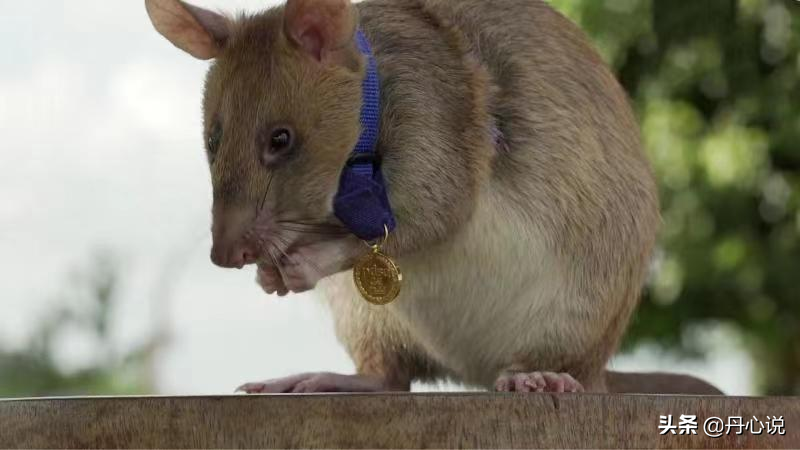A demining rat named Maggawa, who spent five years in Cambodia eradicating 71 mines and 38 unexploded ordnance, was awarded the animal kingdom's highest medal of honor.
Years of war have turned Cambodia into a "country that has stepped on landmines." According to relevant data, Cambodia has left behind about five million mines and other unexploded ordnance.
These "time bombs" threaten the lives of Cambodians at any time, and a series of uncontrollable factors such as broken trees and collapsed houses may trigger the instantaneous explosion of landmines.
From 1979 to 2019, in just 40 years, Cambodia has killed about 19,000 people and injured as many as 45,000 people by landmines and explosive remnants.
At present, Cambodia has half cleared the mined area, but the mined area still haunts Cambodians like a nightmare, because many poor people still live in the mined area.
If the mined area is not cleared every day, Cambodians live trembling every day; If the minefield is not eradicated one day, the place cannot be deeply developed, and the economy will naturally not be able to go up.
The Cambodian government has decided to completely clear the mined area by 2025.
However, mine clearance is not as simple as sweeping the floor. Cambodia has to come up with $400 million to do it, and mine clearance is a high-risk profession where people who clear mines are in danger and risk losing their lives.
The high cost of mine clearance and the cost of life have forced Cambodia to find a different path.
In 2016, Cambodia introduced an African giant rat with a keen sense of smell and sensitivity, and the most famous of these "minesweepers" was one called Magava.
Magawa is not a natural master of minesweeping, he has also experienced three volts of summer training and three nines of winter training.
Magawa was bred in 2013 at a breeding centre in Tanzania.
When Maggawa grew up to be four weeks old, he began to try to contact the trainers, and when he was older, about ten weeks, he officially began training.
Similar to training other animals, trainers use conditioned reflexes to train Magawa. When Magawa smells tea eggs containing explosive ingredients, he will actively touch them, and at the same time he will hear a "clicking" sound. Immediately after completing this series of moves, the trainer will reward Magahua with a piece of food.
This training lasts for nine months.
Of course, the end of the nine-month training period does not mean that Magahua can pick up the beams of demining.
It must be certified to be employed.
In order to adapt to the different geographical environments of Maggawa, after the initial training, Magava also has to undergo harsh field combat training, which is a bit like the road test of subject 3 during the driving license test. When these links are passed, Magawa can successfully obtain the "graduation certificate" of the demining major.
With the graduation certificate as a stepping stone, Magawa is a serious "demining expert".
In 2016, after completing his training, Magawa took on a mission to move to Cambodia and start a five-year career in mine clearance.
Weighing 1.2 kilograms and 70 centimeters long, Magawa is larger than the average mouse, but much lighter than dogs and humans, and even if it strides into a minefield, it will not cause an explosion.
With its light body and sensitive sense of smell, Magawa plays freely in the minefield, it sniffs left and right, as long as it smells explosives, it will be fed back to the deminers in time as in training, and the deminers will further verify and confirm with metal detectors, and then carry out the next step of the removal of the mine bomb.
Before the arrival of Maggawa, a minefield large in the size of a tennis court, which was only manually checked, took four days to complete the task; With the synergy of Magawa, the speed is amazing, and it only takes half an hour to complete.
This shows how much Magawa's contribution is.
With his strength, Magawa has achieved brilliant results after five years on the job. In total, Magahua surveyed about 141,000 square meters of minefield, an area the size of twenty football fields. What is even more amazing is that during this period, Magava found 71 mines and 38 bombs.
Magava is also famous at home and abroad.
In September 2020, Magawa was awarded the Animal Kingdom's highest honour: the Gold Medal by a British charity.
A year later, Magawa retired with honors.
Unfortunately, Maggawa died the year after his retirement, when he was only eight years old.
Magawa completely subverted Uncle Dan's impression of the "street rat" image.
Unexpectedly, such a weak body as Magava could exert such a huge amount of energy to protect the lives and property of the Cambodian people.
Those 71 mines and 38 bombs, without the coordinated clearance of Maggawa, do not know what year and month to be found, but a day is more dangerous.
Maggawa chose to put on cambodian armor, it is an adventurer of thought, a realistic activist, worthy of respect and cherished.
#真知新坐标 #
